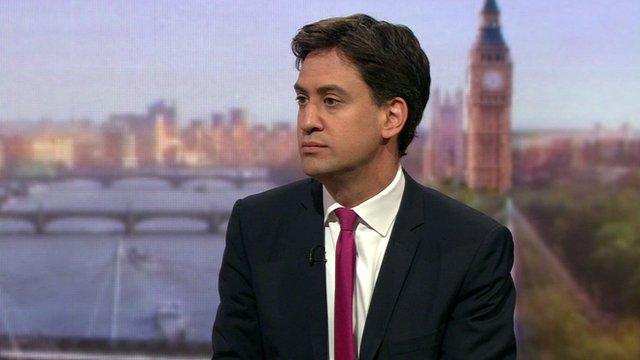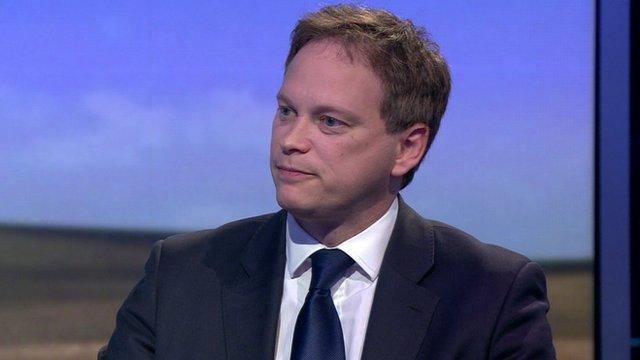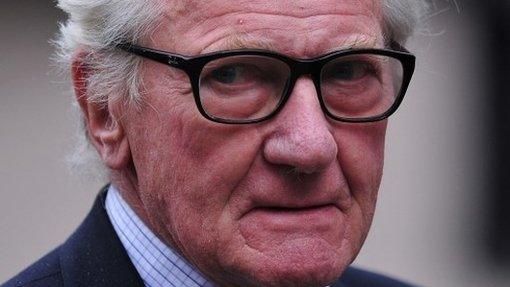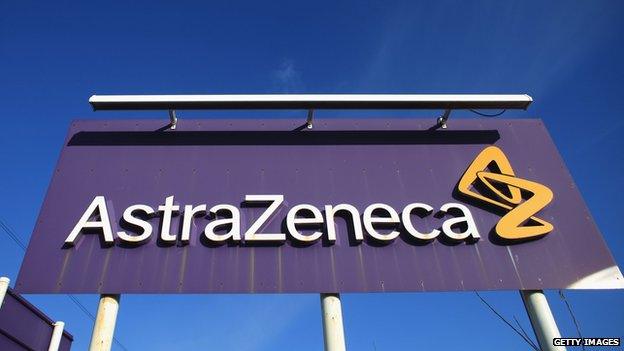Pfizer's AstraZeneca bid: Miliband wants 'national interest' probe
- Published
Ed Miliband: "No other country in the world would be waving this through on the basis of pretty weak assurances from Pfizer"
Ed Miliband has called for an inquiry into whether the US drugs firm Pfizer's planned takeover of AstraZeneca is in the UK's national interest.
The Labour leader has written to the PM to urge a stronger public interest test for takeovers of important businesses.
No 10 has denied Labour claims it is acting as a "cheerleader" for the deal, saying it is fighting for British jobs and British science.
Astra rejected Pfizer's latest bid, which valued it at £63bn, on Friday.
If a deal was to go through, it would be the biggest takeover of a UK company by a foreign firm.
Business Secretary Vince Cable said the government had "been looking at the option around the public interest test, and other factors".
"What we're anxious to ensure as a government, is that we protect the national interest, in respect of our science, our research base, our manufacturing in the UK, and decision making in the UK," he added.
'Dubious record'
Speaking on BBC One's The Andrew Marr Show, Mr Miliband called for an independent investigation into its likely impact on the "long-term science and industrial base of this country" and vowed to widen the scope of the public interest test allowing governments to block deals, if he becomes prime minister.
He said: "No other country in the world would be waving this bid through, nodding it through, on the basis of pretty weak assurances from Pfizer, who have a pretty dubious record when it comes to their record in this country and other takeovers."
Grant Shapps said that tests were in place to make sure that takeovers were in the public interest
In his letter to Mr Cameron the Labour leader said: "I am strongly of the view that, when it comes to such a strategically important part of UK PLC, we need a more substantive assessment of whether this takeover is in the national economic interest before the UK government allows itself to be seen to be supporting it."
"In this particular bid, the stakes could not be much higher," Mr Miliband writes.
"Pfizer's bid for AstraZeneca affects one of the UK's most significant investors in [research and development], a major contributor to our science base, and 6,700 high quality jobs in the UK.
"Despite those high stakes, the impression created in recent days has been of a government cheerleading for this deal on the basis of a short letter with inadequate assurances."
'Neutral'
Conservative Party Chairman Grant Shapps accused Mr Miliband of being "anti-business" and suggested the deal could be "good for Britain".
And a No 10 spokesman said: "The government isn't cheerleading for Pfizer, it is fighting for British jobs and British science.

AstraZeneca has so far declined to engage in talks
"By suggesting otherwise, Ed Miliband is putting politics before the national interest and undermining that position.
"We engaged early with both companies precisely to avoid previous governments failures in these types of situation."
Responding to Mr Miliband's suggestion that there should be a tougher test to ensure takeovers are in the national interest, Business Secretary Vince Cable said the government was looking at "this option amongst others".
He said he had spoken to the chief executives of the two companies and had remained "strictly neutral" on negotiations between them, but refused to "go onto detail" about the discussions.
He said the government was "endeavouring to ensure" that UK-based pharmaceutical research, manufacturing and decision making were "protected".
On Friday, when the US company raised the price it was offering for AstraZeneca to the equivalent of £50 a share, David Cameron said the government had received "robust" assurances from Pfizer that jobs would be protected.
However, Astra said the new terms offered were "inadequate, substantially undervalue AstraZeneca and are not a basis on which to engage with Pfizer".
AstraZeneca employs more than 51,000 staff worldwide, with 6,700 in the UK. Pfizer - whose drugs include Viagra - has a global workforce of more than 70,000, with 2,500 in the UK.
Labour introduced a public interest test in 2002 allowing governments to block takeovers on three specific grounds: media plurality, national security or financial stability.
The Pfizer deal is unlikely to fall into any of these categories but Mr Miliband says he wants to widen the test to include strategic importance, which could cover areas such as science and technology.
- Published4 May 2014

- Published4 May 2014

- Published2 May 2014

- Published2 May 2014

- Published1 May 2014

- Published30 April 2014

- Published2 May 2014

- Published29 April 2014

- Published28 April 2014